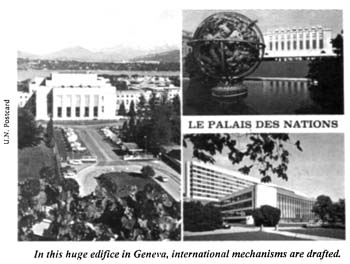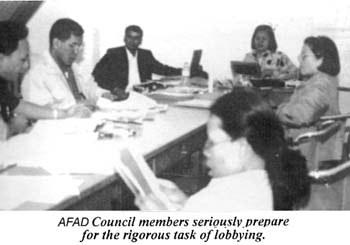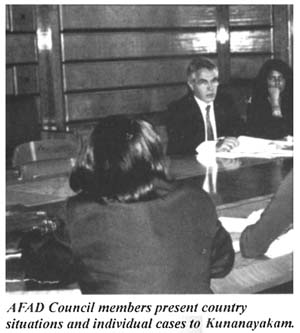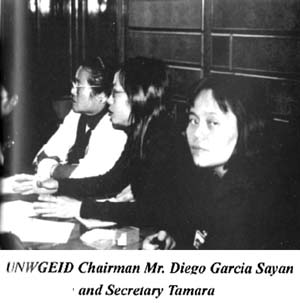The 59TH Session of the UNCHR Vis-à-Vis the Phenomenon of Enforced or Involuntary Disappearances
 On March 17 to April 25, 2003, at the height of the United States of America’s war against Iraq, the 53 member-states of the United Nations Commission on Human Rights (UNCHR) convened once again. Ironically, the United States, stripped of its membership in the Commission in 2002 for serious human rights violations, regained its membership this year.
On March 17 to April 25, 2003, at the height of the United States of America’s war against Iraq, the 53 member-states of the United Nations Commission on Human Rights (UNCHR) convened once again. Ironically, the United States, stripped of its membership in the Commission in 2002 for serious human rights violations, regained its membership this year.
Among many other issues of concern, the UNCHR discussed Item 11. This Agenda Item deals with Civil and Political Rights, which includes torture and detention; involuntary disappearances and summary executions; freedom of expression; independence of the judiciary, administration of justice, impunity, religious intolerance, states of emergency and conscientious objection to military service.
Interventions both from the United Nations member-states and NGOs revealed untold cases of violations of this set of rights despite the collapse of dictatorships and transitions to democracy.
Despite the above, one very important milestone in the struggle against involuntary disappearances was the establishment of the intersessional open-ended working group charged with elaborating a draft legally binding normative instrument for the protection of all persons from enforced or involuntary disappearances. To recall, at its fifty-seventh session, the United Nations Commission on Human Rights decided, in its resolution 2001/46 of 23 April 2001, to establish the said body
The two decades of lobbying by the Latin American Federation of Associations of Relatives of Disappeared-Detainees
(FEDEFAM) and later by the Asian Federation Against Involuntary Disappearances (AFAD) and more recently by
Le Reseau Africain contre les Disparitions Forcees (RADIF) and other prominent international organizations concerned on the issue of involuntary disappearances such as International Commission of Jurists (ICJ), Amnesty International (AI), Human Rights Watch, International Service for Human Rights, La Federation Internationale des Droits de l’Homme
(FIDH) etc., have proven effective and initially achieved fruits.
At the beginning of this year, on the 6th-17th of January, the said intersessional open-ended working group tasked to elaborate a draft legally-binding normative instrument for the protection of all persons from enforced or involuntary disappearances convened for the first time in Geneva, Switzerland. Through the able and committed chairmanship of the French Ambassador in Geneva, His Excellency Bernard Kessedjian, the first session surfaced initial positions of the different government delegations. The general recognition by the United Nations member-states of the global magnitude of the phenomenon of involuntary disappearances has opened the door for the establishment of an international mechanism to protect persons from enforced or involuntary disappearances. While the first session was only the beginning of the whole process at the United Nations, there seemed to be a political will among the United Nations member-states to expedite the process. The role then, of organizations of families of the disappeared to push for the speedy establishment of this mechanism is crucial, indeed. After all, their experience should serve as the very foundation of the main substance of the draft.
One of the highlights under Item 11 was the presentation of Mr. Kessedjian of the results of the first meeting of the newly established body to study the draft treaty. His official report (E/CN.4/2003/71) presented the organization of the work and the debate; the general discussion of the report by Mr. Manfred Nowak, independent expert charged with examining the existing international criminal and human rights framework for the protection of persons from enforced disappearances; discussion on substantive provisions e.g. definition, offenses and penalties, protection against impunity, domestic prosecution and international cooperation, prevention, victims, children of disappeared persons and future activities.
With this report, the United Nations Commission on Human Rights, under Resolution 2003/38, states in the following important paragraphs:
1.3 Requests the intersessional open-ended working group to meet for a period of 10 working days before the sixtieth session of the Commission in order to continue its work, in accordance with the Commission on Human Rights resolutions 2001/46 and 2002/41, and to report to the Commission at its sixtieth session;
1.4 Requests the Chairperson-Rapporteur of the intersessional open-ended working group to undertake informal consultations with all interested parties in order to prepare the next session of the working group.
While developments are positive in so far as the newly established intersessional working group for a legally-binding normative instrument for the protection of all persons from enforced or involuntary disappearances is concerned, a not-so-encouraging report was presented by Mr. Diego Garcia-Sayan, Chairperson of the United Nations Working Group on Enforced or Involuntary Disappearances (UNWGEID).
Mr. Sayan presented a summary of the Working Group’s report (E/CN.4/2003/70) submitted in accordance with the Commission Resolution 2002/41. Mr. Sayan stated as part of his summary the following:
“ During 2002, the Working Group transmitted 120 new cases of disappearances in respect of 24 countries, 63 of these occurred in 2002. As at the last day of its sixty-eighth session on 13 November 2002, the Working Group had 41,618 outstanding cases on its registers. During 2002, the Working Group transmitted 65 cases under its urgent action procedure to the Governments of 13 countries. The highest number of cases of enforced or involuntary disappearance in 2002 allegedly occurred in Nepal (28) and Colombia (14). Since its inception, the Working Group has transmitted a total of 49,872 cases to governments.”
One important point of the UNWGEID’s report is its utter lack of resources to do its work. Such a reality, it said, has impeded the consideration of more than 3,000 new cases, analyzing 12,000 replies by Governments and 200 comments by the sources. Mr. Sayan admitted that if no solution could be found, the Working Group would cease to function as an effective instrument of the Commission on Human Rights.
Amidst all this, organizations of families of the disappeared from various parts of the world made their presence conspicuous through various forms of lobbying activities at the United Nations. After all, they play an indispensable role in the fight against impunity.
Making the Victims’ Voice Heard Loud and Clear
A loud message should therefore be conveyed to the member-states of the United Nations by AFAD,
FEDEFAM, RADIF and other NGOs concerned on the issue of enforced or involuntary disappearances. This is so because the eventual ratification of the draft treaty is of paramount importance to them in their long struggle against impunity. While still working for the establishment of a treaty, equally important is the immediate task of bringing to the fore individual cases, both old and new as well as general analyses based on the particularity of the contexts of different countries.
Since the formation of its core group, the Asian Federation Against Involuntary Disappearances (AFAD) has been lobbying annually for the ratification of the United Nations Draft Convention for the Protection of All Persons from Enforced or Involuntary Disappearances both during the sessions of the UNCHR and of the UNWGEID. Not having a consultative status with the United Nations Economic and Social Council (ECOSOC) of its own, AFAD used the accreditation of different organizations to access entry to the United Nations in order to ensure that the voice of the families of the disappeared be heard loud and clear. All through the years since AFAD’s existence, it has benefited from
FEDEFAM’s generosity of extending its status. More organizations this year offered to help, such as Novib, International Service for Human Rights and
FIDH. This made possible the participation of AFAD members in the 59th session of the United Nations Commission on Human Rights.
 Thus, AFAD members made full use of its 10-day stay in Geneva through the following: participation during official sessions of the UN member-states to listen to thematic and country issues and participation in NGO activities parallel to the session; meeting with the United Nations Working Group on Enforced or Involuntary Disappearances (UNWGEID); presentation of oral interventions by the Families of Victims of Involuntary Disappearance (FIND) and
KontraS and Ikohi (in the name of Novib): participation in the forum organized by Linking Solidarity to discuss the draft treaty as well as the performance of the UNWGEID; meeting with
FEDEFAM to improve coordination and most importantly, direct lobbying with governments.
Thus, AFAD members made full use of its 10-day stay in Geneva through the following: participation during official sessions of the UN member-states to listen to thematic and country issues and participation in NGO activities parallel to the session; meeting with the United Nations Working Group on Enforced or Involuntary Disappearances (UNWGEID); presentation of oral interventions by the Families of Victims of Involuntary Disappearance (FIND) and
KontraS and Ikohi (in the name of Novib): participation in the forum organized by Linking Solidarity to discuss the draft treaty as well as the performance of the UNWGEID; meeting with
FEDEFAM to improve coordination and most importantly, direct lobbying with governments.
Lobbying was the most important agenda of AFAD’s participation in the 59th session of the UNCHR. In the words of an international lobbyist, while the final decision does indeed lie in the capitals, the conceptualization and drafting are undertaken by the UN-Geneva based diplomats. Thus, while it is difficult, AFAD member-organizations directly lobbied mostly Asian government delegations, whose positions vis-à-vis the issue of involuntary disappearances in their respective countries and the draft convention were not as encouraging as that of the positions of the Latin American delegations.
It is significant to note that Latin American governments, under the Latin American and Caribbean Group
(GRULAC – Grupo Latinoamericano y del Caribe), in a humble admission of the dark history of involuntary disappearances in their continent, explicitly support the idea of creating an international mechanism criminalizing involuntary disappearances. In an oral intervention delivered during the intersessional body’s meeting in January, the Chilean delegation, in the name of
GRULAC, during the first meeting of the intersessional body last January, humbly admitted that involuntary disappearances are part of history in the Latin American continent. “In a not-so-distant past, in our Region, in the name of national security, thousands of people, generally youths and children, have been tragically categorized to have disappeared.” Thus, in the same oral intervention,
GRULAC hopes for a future instrument that would have to: 1. ensure the impossibility of justifying disappearances…;2. ensure its preventive character in order to impede the phenomenon of involuntary disappearances. Thus, there is a need for means of education and information as principal instruments in the task of prevention; 3. include solid mechanisms in the judicial field and in the humanitarian cooperation that contribute effectively in putting an end to involuntary disappearances…;4. contemplate the responsibility of the State and third States that contribute to the phenomenon of disappearances in other countries; 5. establish heavier punishment on cases of disappearances against persons belonging to vulnerable groups such as elderly, minors and pregnant women; 6. to contemplate the situation of disappeared children; 7. strengthen the fight against impunity; 8. include the issue of reparation.
The position of the Asian governments lags far behind the above-mentioned position of their Latin-American counterparts. Nevertheless, believing in the fact that a journey of a thousand miles starts with the first step, AFAD optimistically, but not without difficulty, lobbied Asian governments on the issue both in terms of immediate and long-term concerns.
AFAD first met with the Indonesian government delegation. KontraS and
Ikohi representatives presented two very recent cases of involuntary disappearances in Aceh which occurred just before their departure from Jakarta to Geneva. The case of the disappearances of Aceh activists, Muchlis Ishak and Zulfikar, who both disappeared on March 25, 2003 and of Muchlis Muttaqien, who disappeared on March 10, 2003 were presented for action to the Indonesian delegation. While the Indonesian delegation accepted the fact sheets and promised to look into the matter, the head of the delegation mentioned that he felt uncomfortable that his brother and sister Indonesians had to travel all the way from Jakarta to Geneva to discuss matters of internal country concerns. The comment was readily answered by the reality that AFAD’s work in its respective countries of concern which is being complemented with international work. AFAD seeks the help of the United Nations as a venue to air grievances because domestic remedies, although not fully exhausted, have been found wanting. One matter that AFAD followed-up was the unfulfilled promise of former President Abdurrahman Wahid to invite the United Nations Working Group on Enforced or Involuntary Disappearances to visit Indonesia. The delegation was unaware of the promise and said that they would look into it. When asked about its stance regarding the United Nations Draft Convention on the Protection of All Persons from Enforced or Involuntary Disappearances, the Indonesian delegation said that the government needs time to study it.
Despite the apparent lack of openness on the part of the Philippine delegation to a new treaty, AFAD members, together with a delegate from
FEDEFAM, Mrs. Loyola Guzman, still spoke to the head of the Philippine delegation, who categorically said that the draft treaty, if ratified, would not have much added value. He emphasized the need to work on the domestic level in order to resolve this problem. Asked about the pending bill in both Philippine Houses of Congress, the Philippine delegation head cited that there are existing laws in the country, which can be used for cases of involuntary disappearances. Still, he said that on the whole, the Philippine government is studying the draft convention.
Even if the representatives of the Organization of Parents and Family Members of the Disappeared (OPFMD) in Sri Lanka were absent during the AFAD activities in Geneva, AFAD members met with the Sri Lankan delegation. No less than the Sri Lankan Ambassador, His Excellency M. Prasad Kariyawasam met with the AFAD members and assured them that the government is doing its best to cooperate with the United Nations Working Group on Enforced or Involuntary Disappearances. While it is an admitted fact that this problem is an issue in Sri Lanka, the Sri Lankan delegation proudly said that this issue is almost resolved. AFAD members also brought to the attention of the Sri Lankan delegation the need to expedite the resolution of more than 500 cases pending in court as well as the particular concern of the OPFMD regarding the issue of compensation. According to OPFMD, there is discrimination in compensating families of victims who were government employees and families who were non-government employees. Moreover, the need to increase the amount of compensation was brought up .
His Excellency Prasad Kariyawasam said that his government would look into the issues raised by AFAD. A few years ago, Sri Lanka presented a resolution at the United Nations Commission on Human Rights in support of the draft convention, but this year, there is no explicit reiteration of the same support. There are also other equally important issues, which need government attention. The Sri Lankan delegation however reassured AFAD of its continuing support for the draft treaty.
AFAD member-organizations accompanied Ms. Anya-on Khiewboriboon of the Relatives Committee of the May 1992 Heroes in the meeting they requested from the Thai delegation. The Ambassador of Thailand, Her Excellency Laxanachantorn Laohaphan and her colleagues acknowledged the still on-going sufferings of the families of the victims and said that negotiations are going on between the government and the Independent Committee for May 1992 Relief and Redress in which the families of the victims are represented. AFAD brought up the matter of the need to return the remains of the victims. The Thai delegation left the burden of searching for possible locations of such graves to the families of the victims before they could act accordingly. Unfortunately, the families have little possibility of doing so.
 To complement the lobbying, two of the AFAD member-organizations delivered oral interventions during the official sessions. A three-minute intervention, however brief, is powerful enough to be heard by governments all over the world and be included in the official report of the Commission on Human Rights. The Families of Victims of Involuntary Disappearance (FIND) and
KontraS and Ikohi presented the still unresolved problems in their respective countries and in the rest of the world and urged the United Nations to act, among other things, on beefing up the UNWGEID’s resources and expediting the process of the ratification of an international treaty criminalizing disappearances.
To complement the lobbying, two of the AFAD member-organizations delivered oral interventions during the official sessions. A three-minute intervention, however brief, is powerful enough to be heard by governments all over the world and be included in the official report of the Commission on Human Rights. The Families of Victims of Involuntary Disappearance (FIND) and
KontraS and Ikohi presented the still unresolved problems in their respective countries and in the rest of the world and urged the United Nations to act, among other things, on beefing up the UNWGEID’s resources and expediting the process of the ratification of an international treaty criminalizing disappearances.
Apart from the individual lobbying with Asian governments, AFAD member-organizations had an hour meeting with Mr. Diego Garcia-Sayan and the UNWGEID’s Secretary, Ms. Tamara Kunanayakam. The Working Group has been seen as controversial owing to the fact that it was recently reconstituted. The Chairperson is a former Prime Minister of Peru. The new representative from Asia has accordingly not attended any of the three sessions during the year 2002. Moreover, its utter lack of material and human resources prevented the Working Group from functioning efficiently and effectively.
 The value of the meeting was for AFAD member-organizations to present old and new cases as well as general situations. The criteria for accepting cases were reiterated. Mr. Sayan stressed that cases should pass the criteria. He noted that the WG needs to receive during the year, if possible, the cases of disappearances from the Tiananmen massacre of 1989. Additional cases from Thailand, other than those submitted by Amnesty International also need to be submitted. Moreover, on the report of
KontraS and Ikohi regarding disappearances, refinements to ensure accuracy and completeness should be added. On the voluminous cases submitted by the Families of Victims of Involuntary Disappearances (FIND), the Working Group has still to consider these in their annual report. Fact sheets of each of the cases of the list of the disappeared in Kashmir have still to be submitted.
The value of the meeting was for AFAD member-organizations to present old and new cases as well as general situations. The criteria for accepting cases were reiterated. Mr. Sayan stressed that cases should pass the criteria. He noted that the WG needs to receive during the year, if possible, the cases of disappearances from the Tiananmen massacre of 1989. Additional cases from Thailand, other than those submitted by Amnesty International also need to be submitted. Moreover, on the report of
KontraS and Ikohi regarding disappearances, refinements to ensure accuracy and completeness should be added. On the voluminous cases submitted by the Families of Victims of Involuntary Disappearances (FIND), the Working Group has still to consider these in their annual report. Fact sheets of each of the cases of the list of the disappeared in Kashmir have still to be submitted.
Because immediate concrete results still remain to be seen, one might conclude that international lobbying is not worth the effort . Certainly , without the lobbying of human rights organizations, there could have been no international instruments which are not only meant to facilitate resolution of cases of the past but also to prevent their recurrence. Thus, prevention is the key to this arena of struggle.
The Value of Inter-Continental Cooperation
The Project Linking Solidarity of the Netherlands Humanist Committee on Human Rights (HOM) convened a forum on an International Response to Enforced Disappearances: NGO Concerns About Recent Developments. No less than the French Ambassador H.E. Kessedjian delivered the welcome address. The said forum was participated in by various NGOs concerned with the same problem, including AFAD, which had the biggest delegation.
Themes comprehensively discussed during the whole day event included concerns on the draft treaty, which was eloquently presented by Federico Andreu-Guzman of the ICJ and concerns about the UNWGEID also comprehensively presented by Olivier de Frouville of
FIDH.
Discussions dealt with both legal matters as well as concrete experiences of organizations working in the field. Such complementation enabled the group to come up with some recommendations for joint action. One of the main resolutions of the body was to participate actively in the next session of the intersessional open-ended working group to draft a normative legally binding instrument for the protection of all persons from enforced or involuntary disappearances. During the participation, needless to say, prepared comments on the existing provisions of the draft treaty are important. Another resolution asked that each organization present to
FIDH its concrete experiences in dealing with the UNWGEID. A joint letter of concern on the present state of the Working Group should be presented to the 59th session of the UNCHR before it is scheduled to end.
Lobbying as an Integral Part of The Fight Against Impunity
The United Nations is composed of governments, many of which violated and continue to violate human rights. This reality all the more makes lobbying work a difficult task. It remains a paradox that while we recognize the utmost importance of lobbying governments, we have to bear in mind that lobbying is not the end-all and be-all of human rights work. Certainly however, it is an integral part in the fight against impunity. There are many other creative ways of doing it.
Hence, while lobbying was the principal objective of AFAD’s meeting in Geneva, AFAD members also maximized their being together in order to serve as a venue for consolidation. Thus, AFAD held its Regular Council meeting to discuss the situation of each country of concern, which is the context of the organizational situation of each member. This Council meeting was especially significant in the sense that it was a preparation for AFAD’s Second Founding Congress scheduled on August 26-30, 2003.
A strong organization is a key to a more effective human rights work. Honing AFAD’s experience and skills in lobbying and advocacy will certainly generate consolidating effects in the Federation. This needs to be complemented by internal consolidation through building and strengthening of capacities to ensure sustainability of efforts. After all, the struggle against impunity is long-drawn. A strong Federation ensures sustainability of efforts, which is imperative in this long and difficult journey towards a world free from involuntary disappearances.